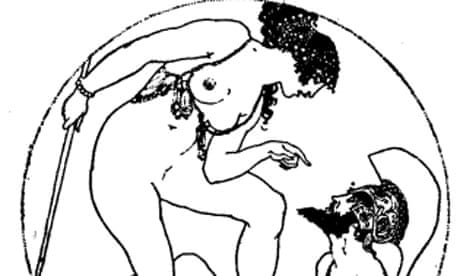In the opening scene of
the play a distinctive theme gender and power, more specifically women’s roles
in Greek culture, is clearly illustrated. Our powerful woman lead, Lysistrata,
wants to Unite Greece again. To do this she calls a meeting in which she
requests that all women be present. However she grows impatient when they do
not show, admitting that she is “positively ashamed to be a woman” (16). However
her friend Kleonike just reassures her that the women are still fulfilling their
womanly duties, such as to “fuss over hubby, wake the maid up, put the baby
down, bathe him, feed him…” (17). Although Lysistrata despises the labels put
upon them, she believes that they will be able to use these against the men in
order to stop the war. She believes that “the hope and salvations of Hellas
lies within the women” (18). Her request
is simple- all women shall stop having sex with their husbands until the war is
over: a sex strike. Lysistrata wants the women to use their sexuality and
exploit their stereotypical identity in order to get the men to stop the war. Skimpy,
alluring lingerie, makeup and opaque underwear are the key to the men’s relinquish.

Lysistrata understands that the men wouldn't listen to the women's wishes under normal circumstances. As a leader, she realizes she must do something to catch their attention. She uses the one power women have, their appearances. If all the women dress in sexy clothing and adhere to Lysistrata's plan, the men will pay attention to their desires.
ReplyDeleteI like that you note that the key to stopping the war is by using the women's sexuality against their husbands. The image is a good illustrating of the power the women hold over the men. The roles are clearly switched by having the woman appear strong and powerful and the man appearing to just be obedient.
ReplyDeleteYes, in most cultures men hold power over women. Because men sexualize women, they become weak and vulnerable. So when the women use this weakness against them, the tables turn and the women become in control as my illustration shows.
DeleteThis comment has been removed by the author.
ReplyDeleteFeminine power is definitely a key point expressed by Lysistrata. The women are proving they can be just as powerful and influential as men can be. It is true what Bailey said about how "in most cultures men hold power over women." Do you think our culture today is equal for both genders?
ReplyDeleteThis could also be looked at as if Lysistrata were starting a feminist group. She formed a group, discovered what was making them dissatisfied, and made an objective for them to strive towards. Great job pointing out how well they dissected the issue to achieve this.
ReplyDeleteYes I agree that gender roles is a big theme in the beginning of the play. No one really expects big things from women, and most of the men don't give them enough credit or respect. I like how you noted that power also had a big effect on the men and that women could control so much just by taking away one thing.
ReplyDelete